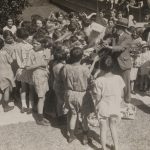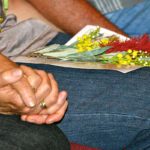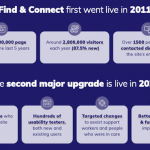With thanks to The Healing Foundation. To raise awareness about Stolen Generations survivors, The Healing Foundation shares this animation about the impacts of intergenerational trauma: https://youtu.be/Y-RaB19D13E
Find and Connect was established to help remove the barriers that have stood in the way of people who were in care before 1990 accessing the records that were created about them.
Over the last year, we have expanded our work in this area to provide training packages to archivists, who are often responsible for providing records access, but may have no understanding of the trauma associated not just with the contents of the records, but in the processes of accessing records, records being held by organisations that may have previously been responsible for neglect or abuse, and the bureaucratic nature of archives generally.
In 2020 we developed a toolkit for people who work with records to provide a foundation for better access to records and develop safe, empathetic practice.
This year, we collaborated with a number of specialists in the area, including the Jumbunna Institute for Indigenous Education & Research and the Australian Society of Archivists to develop the Better Access to Stolen Generations Records for the Healing Foundation.
This toolkit is key to The Healing Foundation’s Make Healing Happen initiative, which “sets out a clear plan of action to improve access to and preservation of records relating to stolen children and separated families”, and builds on the work of the Foundation to further the original recommendations of the 1997 Bringing Them Home report.
“The resources will help the sector describe the historical background of the Stolen Generations, including information relating to government policies around child removal and highlight the ongoing impacts of these policies on Aboriginal and Torres Strait Islander peoples today, including the recognition of intergenerational trauma.”
The training package includes:
Part One: The historical background of the Stolen Generations.
Part Two: The ongoing impacts of laws, policies and practices on Aboriginal and Torres Strait Islander people today.
Part Three: Broad context of the records created in relation to the Stolen Generations and the challenges of access to these records.
Part Four: Summary of government responses to the Stolen Generations, and the implications for archives and records.
Part Five: Providing trauma-aware, healing-informed and culturally safe access to records.
Part Six: The role of records in healing, redress and reparations for Aboriginal and Torres Strait Islander people.
Whilst there were Homes specifically for the children who were forcibly removed from their parents, such as Kinchela, many were removed to institutions such as orphanages, farm schools and juvenile remand. Their records remain with organisations responsible for or aligned with those institutions.
Providing appropriate cultural training to provide safe records access to Stolen Generations is equally important to all record holders, regardless of whether institutions were specifically designated for forcibly removed children, or more broadly for all children who were removed from their families.
Registration to Better Access to Stolen Generations Records is free, and you can sign up here: https://www.archivists.org.au/events/event/better-access-to-stolen-generations-records






